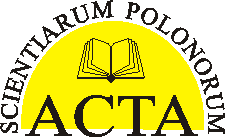Tytuł
In vitro REGENERATION OF Fragraria PLANTS
Autor
Małgorzata Mikiciuk, Marta Rokosa
Słowa kluczowe
micropropagation, Fragaria, strawberry, shoot multiplication
Streszczenie
Fragaria is one of genus in Rosaceae family. The most popular representative is strawberry (Fragaria × ananassa Duch.) and wild (woodland) strawberry (Fragaria vesca L.), which taste attributes are very attractive for a huge number of consumers around the world. The plants have many beneficial traits, such as low-caloric, high amount of antoxidants and vitamin C, laxative, diuretic, astringent, antidiarrheal and antiseptic properties. Cultivation of Fragaria plants is widespread worldwide with particular emphasis on moderate climate zone, also with use of a plant tissue culture method. This thesis showed and contrasted other studies about Fragaria plants propagation under in vitro conditions. In this method the most often used explants are leaf explants. Very rarely are used seeds. Mainly, the plants are propagated on basal medium of mineral composition by Murashige and Skoog in 8 hour dark and 16 hour light contidions. The most efficient cytokinin used to root induction is indole-3-butyric acid (IBA). The plant acclimatization had varying effectiveness – from a few to several dozen survival percent. During micropropagation of Fragaria plants, somaclonal variation occurs, which is dependent on age culture, frequency of passage and medium composition.
Strony
145-158
Cytowanie
Mikiciuk, M., Rokosa, M. (2017). In vitro REGENERATION OF Fragraria PLANTS. Acta Sci. Pol. Hortorum Cultus, 16(5), 145-158.
Pełny tekst


